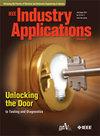基于马尔可夫链的弹性智能电网点对点能源交易框架
IF 4.5
2区 工程技术
Q2 ENGINEERING, ELECTRICAL & ELECTRONIC
引用次数: 0
摘要
本文提出了一个弹性驱动的框架,利用先进的控制技术,特别是马尔可夫链方法,来增强点对点(P2P)能源交易网络在低概率高影响事件(LPHIE)下的鲁棒性,如气候变化、网络攻击和自然灾害。该框架通过整合可再生能源、优化能源交换和通过新指标量化系统弹性,解决了维持能源系统稳定性的关键挑战。一个关键的贡献在于开发了一种多层策略,该策略结合了动态故障缓解的模糊逻辑和一个结合太阳能光伏、电池存储和电动汽车的三层能源管理系统。此外,该框架利用区块链技术确保能源交易的透明度、安全性和公平性,同时促进不同消费群体之间的包容性和公平性。通过推进最先进的弹性模型,本研究为分散系统中的可持续能源管理提供了坚实的基础,为减轻LPHIE的影响和推进能源民主化提供了实用的见解。本文章由计算机程序翻译,如有差异,请以英文原文为准。
Peer-to-Peer Energy Trading Framework Using Markov Chain for a Resilient Smart Grid
This paper presents a resilience-driven framework leveraging advanced control technologies, particularly a Markov chain approach, to enhance the robustness of peer-to-peer (P2P) energy trading networks under Low Probability High Impact Events (LPHIE) such as climate change, cyberattacks, and natural disasters. The proposed framework addresses critical challenges in maintaining energy system stability by integrating renewable energy sources, optimizing energy exchange, and quantifying system resilience through novel metrics. A key contribution lies in the development of a multi-layered strategy that incorporates fuzzy logic for dynamic fault mitigation and a three-tier energy management system combining solar PV, battery storage, and electric vehicles. Additionally, the framework utilizes blockchain technology to ensure transparency, security, and fairness in energy trading, while promoting inclusivity and equity among diverse prosumer groups. By advancing the state-of-the-art in resilience modeling, this study provides a robust foundation for sustainable energy management in decentralized systems, offering practical insights into mitigating the impacts of LPHIE and advancing the democratization of energy resources.
求助全文
通过发布文献求助,成功后即可免费获取论文全文。
去求助
来源期刊

IEEE Transactions on Industry Applications
工程技术-工程:电子与电气
CiteScore
9.90
自引率
9.10%
发文量
747
审稿时长
3.3 months
期刊介绍:
The scope of the IEEE Transactions on Industry Applications includes all scope items of the IEEE Industry Applications Society, that is, the advancement of the theory and practice of electrical and electronic engineering in the development, design, manufacture, and application of electrical systems, apparatus, devices, and controls to the processes and equipment of industry and commerce; the promotion of safe, reliable, and economic installations; industry leadership in energy conservation and environmental, health, and safety issues; the creation of voluntary engineering standards and recommended practices; and the professional development of its membership.
 求助内容:
求助内容: 应助结果提醒方式:
应助结果提醒方式:


